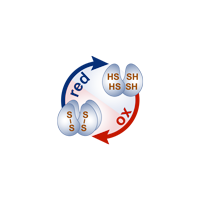Research interest
Oxidative stress is associated with the onset and progression of many diseases and age-related disorders. Although efficient antioxidant systems have evolved to maintain the redox homeostasis, the accumulation of reactive oxygen species (ROS) can damage all cellular components including proteins. How do cells cope with the severe risk of protein aggregation under these conditions?
Since oxidative stress induces a substantial drop in cellular ATP-levels, the activity of canonical chaperones and proteases is reduced. The activation of redox-sensitive chaperones, which function as ATP-independent “holdases” for unfolding protein intermediates, serves as first line of defense to prevent wide-spread protein aggregation. During stress recovery, these chaperones become inactivated again which results in the release of client proteins and the transfer to ATP-dependent proteostasis systems which mediate their refolding, targeting or degradation.
Our lab studies the cellular function and regulatory mechanisms of redox-regulated chaperones and their crosstalk with the proteostasis systems in eukaryotes. Our main goals are to (1) unravel the underlying regulatory network that confers the stress-specific activation and subsequent inactivation of ATP-independent chaperones, (2) identify client proteins that rely on the chaperone function under oxidative stress conditions, and (3) discover novel stress-sensing chaperones that serve to deal with oxidative unfolding stresses in subcellular compartments.
